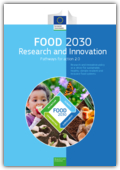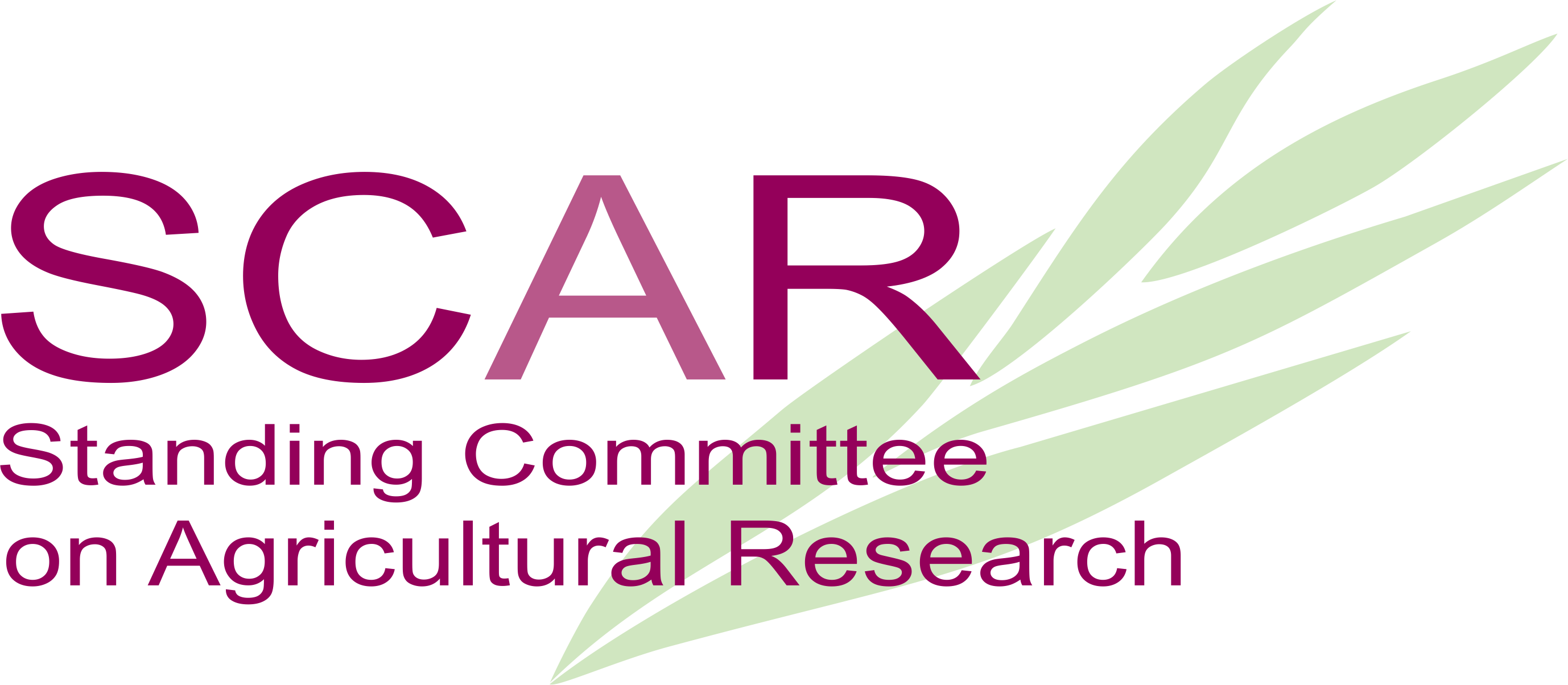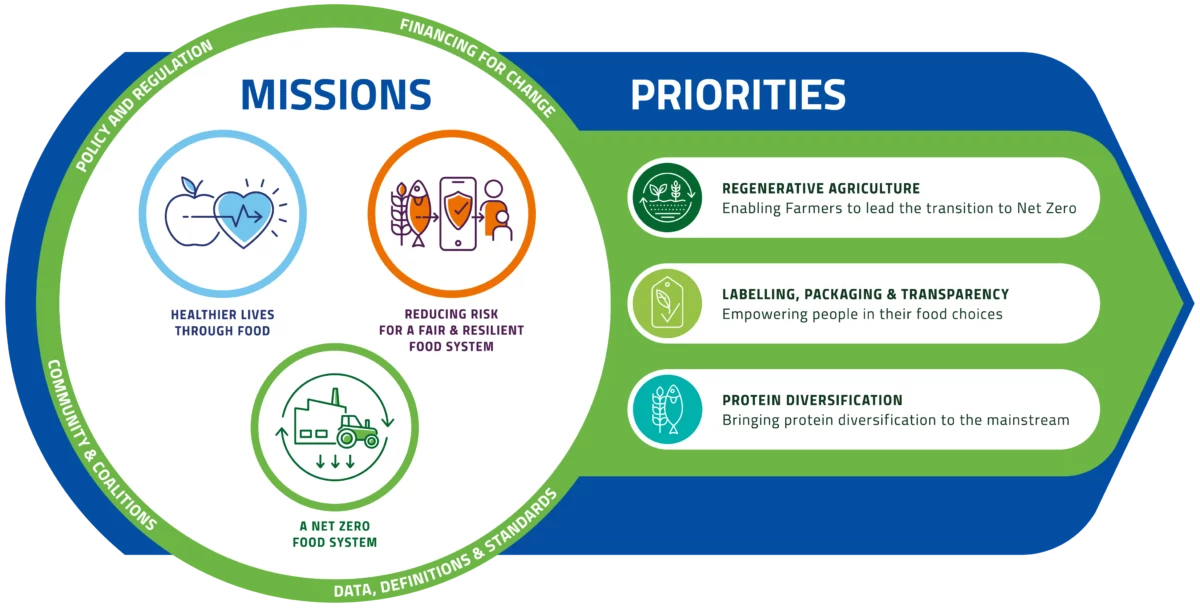23-25 January 2024. Joint SCAR workshop: “Research needs and priorities for the transformation to Sustainable Food Systems (SFS) at European and global level”
For more information read the CONCEPT NOTE
Relying on the advanced knowledge on international research and on food systems, the ARCH, Bioeconomy and Food Systems Strategic Working Groups (SWG) of SCAR is organizing an International Expert Consultation (workshop) on the issue of SFS. The aim is to identify major and priority research questions that shall be addressed in the short, medium and long terms and to support the delineation of urgently needed measures for successful policy development and implementation towards a Sustainable Global Food System. International cooperation should be considered while tackling the challenge of global interdependencies of food systems.
Relying on the advanced knowledge on international research and on food systems, the ARCH, Bioeconomy and Food Systems Strategic Working Groups (SWG) of SCAR is organizing an International Expert Consultation (workshop) on the issue of SFS. The aim is to identify major and priority research questions that shall be addressed in the short, medium and long terms and to support the delineation of urgently needed measures for successful policy development and implementation towards a Sustainable Global Food System. International cooperation should be considered while tackling the challenge of global interdependencies of food systems.
Report released on 28/06/2024: Research needs and priorities for the transformation to sustainablefood systems at European and global level # 12 p.
Workshop outcomes:
- List of priority research themes for international cooperation, highlighting scale and scope of actions, methodologies and actors required;
- Creation of a better understanding of the skills, knowledge and evidence gaps currently holding back action to transform food systems at different scale, and consequently to kick start the list of priority research themes;
- Fostering attention to the international aspects that are already included in the SRIA of the FutureFoodS partnership (in particular by contributing to WP 8)
- Reflection (or Position) paper
- List of actors and networks to be taken into account and contacted by the partnership.
Over 3 days participants will discuss the following set of questions during the breakout sessions:
- Question Set 1. Research gaps on safe and nutritious food and sustainable and healthy diets at global level
- Question Set 2: Research gaps to support an equitable and fair global transformation of food systems
- Question Set 3: Research gaps to improve resilience and food security at European and global scales
- Question Set 4: Research gaps related to governance and policies
Extract of the programme
- 23/01 Science diplomacy and the link of R&I policy to the Global Gateway Strategy
Nienke Buisman - Head of Unit, International Cooperation Policy, DG RTD
She referred to the website Turning ideas into opportunities. Africa's and Europe's development opportunities depend on science, technology and innovation (STI). But STI won't automatically lead to new opportunities without concerted effort. This story describes how the African Union and the European Union aim to unlock and scale up tangible growth through the AU-EU Innovation Agenda. Existing projects for food and nutrition security and sustainable agriculture (FNSSA) were prioritised to support new ventures across the whole food value chain. As the most mature partnership of its kind, the lessons from FNSSA will guide similar future efforts in the energy and healthcare sectors.
During 2021, the European Commission Directorate-General for Research and Innovation led a process assessing the 261 projects included in the FNSSA database at the time. This list excluded many new projects that were subsequently added to the database, but which are still only in their early stages. These 261 projects were screened according to their business and innovation potential, based on which a subset of 47 projects were further filtered qualitatively based on their project outputs. From these, 34 projects were identified based on the fact that they had tangible outputs with sufficient detail to be scored using Key Performance Indicators (KPIs) of potential impact on business, society, and the environment. The 34 projects were included in a quantitative assessment.
The Joint Research Centre's Africa Knowledge Platform mapped the 14 FNSSA priority projects to identify regional patterns to inform localised support strategies. - 23/01 DG INTPA’s engagement in Global Food Systems transitions Leonard Mizzi - Head of Unit, Sustainable Agri-Food systems and Fisheries, DG INTPA
- 23/01 Short introduction of SCAR SWGs: role and mission Agenda for the workshop Siegfried Harrer, SCAR ARCH SWG chair Minna Huttunen, SCAR FS SWG co-chair Luka Juvancic, SCAR BIOECONOMY SWG chair
- 23/01 FutureFoodS-Sustainable Food Systems Partnership for People, Planet and Climate Gilles Feron, coordinator of FutureFoodS partnership, ANR, FR
 23/01 Keynote Presentation:
Research needs for sustainable food systems – concepts and priorities
Joachim von Braun, Professor, University of Bonn, DE
23/01 Keynote Presentation:
Research needs for sustainable food systems – concepts and priorities
Joachim von Braun, Professor, University of Bonn, DE
He referred to the UNFSS and the importance to include indigenous knowledge. See: 14-15 March 2024. Indigenous Peoples' Knowledge and the Sciences. Combining knowledge and science on vulnerabilities and solutions for resilience- 24/01 Keynote presentation:
Irene Annor-Frempong, Director for R&I at ‘The Forum for Agricultural Research in Africa’
(FARA); LEAP4FNSSA project coordinator - Advances of the AU-EU FNSSA Partnership towards Food Systems Transformation
Irene presented among others the Consortium Europe-Africa on Research and Innovation for Food Systems Transformation (CEA-FIRST) project
CEA-FIRST, the Consortium Europe Africa on Research and Innovation for Food Systems Transformation, consists of 21 partners from Africa and Europe, partly from the former LEAP4FNSSA, extended with new public and private network partners. CEA-FIRST will operationalise the International Research Consortium (IRC) as a long-term platform on food and nutrition security and sustainable agriculture (FNSSA) in line with the FNSSA Roadmap of the AU-EU High-Level Policy Dialogue (HLPD).
The IRC is a member-based, multi-actor platform and will work towards increasing synergies and coherence while reducing fragmentation and duplication of research efforts. Its aim is to promote higher returns on investments and impact on business development in Africa and Europe, by linking actors, research and innovation projects, initiatives, and funding programmes.
CEA-FIRST will:
- provide public access to a large knowledge platform,
- offer a sound method for analysis of R&I activities,
- support the updating of the FNSSA Roadmap,
- establish operational working groups and thematic research calls.
The final output will be a fully functional IRC, including governance bodies. CEA-FIRST will also support its liaison with the High-Level Policy Dialogue (HLPD). It will create a learning environment, including communication channels, to support multi stakeholder networks and to strengthen R&I coordination. The IRC will also serve related AU-EU policy priorities, such as the Climate Change and Sustainable Energy and the Innovation Agenda of the HLPD, as well as the European Green Deal priorities (and farm to fork strategy) and the AU priorities like the African Free Trade Area.
- 25/01 Research gaps related to governance and policies in Agrifood systems transformation
Maximo Torero, Chief Economist, FAO
He shared the resource: FAO (2023) Achieving SDG 2 without breaching the 1.5 °C threshold: A
global roadmap, Part 1 #50 p.
FAO's roadmap involves an extensive process that spans three years, starting with COP 28 in 2023. It commences with a global vision for what ails agrifood systems today and goes on to explore financing options for the actions required, before culminating in a discussion of how to attract concrete investment and policy packages by the time COP 30 takes place. It also examines how to integrate technical assistance into our strategies while supporting sustainable investment plans. FAO's roadmap objective is to create a repository of both bankable and non-bankable projects in various domains. The In Brief version of the roadmap contains the key messages and main points from the report, and is aimed at the media, policy makers and a more general public
The organisation team:
Siegfried Harrer (BLE, DE); Emmanuel Albina (CIRAD), Anastasiya Terzieva (INRAE); Alexandre Dubois (FORMAS); David Kranjac (Faculty of Agriculture in Osijek, HR); Jessie Doppler (JPI HDHL) Johanna Kohl (LUKE); Luka Juvančič (University of Ljubljana, SI ); Maroun El Moujabber and Claudio Bogliotti (CIHEAM Bari); Maeve Henchion (Teagasc); Martin Behrens (FNR); Michaela Theurl (Environment Agency, AT); Niels Fold (University of Copenhagen, DK); Vera Musch (Ministry of Agriculture, Nature and Food Quality, NL)Participation:
On invitation only (European and non-European researchers, regional and sub-regional research
fora, as for example CIHEAM, PRIMA, UFM, CGIAR, FAO, FARA, ASARECA, CORAF, IICA, WFP, WHO and others
organisations, SCAR ARCH, SCAR BSW and SCAR FS members, 80 participants)
EC (2023) Food 2030 Research and Innovation – Pathways for action 2.0: Research and innovation policy as a driver for sustainable, healthy, climate-resilient and inclusive food systems # 160 p.
EAT Food Europe launched a competitive, open Impact Funding Framework to promote ambitious,long-term collaboration that will lead to food systems change to benefit us all.
Bibliography:
- EC (2021a) Green Deal
- EC (2021b) Farm to Fork Strategy
- EC (2022b.) European Biodiversity Strategy
- EC (2022d.) European Bioeconomy strategy
- FAO (2018) Sustainable food systems, Concept and framework
- HLPE (2014) Food Losses and Waste in the Context of Sustainable Food Systems. HLPE, Rome.
- UN (2022) Sustainable Development Goals
- SCAR (2018) Assessment ofResearch and Innovationon Food Systems byEuropean Member StatesPolicy andFunding Analysisby Standing Committee onAgricultural Research (SCAR)Strategic Working Groupon Food Systems #35 p.

Additional resources:
EC (2023) Food 2030 Research and Innovation – Pathways for action 2.0: Research and innovation policy as a driver for sustainable, healthy, climate-resilient and inclusive food systems # 160 p.- This publication provides an update on the European Commission’s Food 2030 initiative and aims to guide future research and innovation policy reflections related to Horizon Europe, the farm-to-fork strategy, the European Green Deal and beyond. It sets out eleven pathways for action where research and innovation can concretely deliver co-benefits related to nutrition, climate, circularity, and communities, at multiple levels: from local to international. See extracts from the report in a blogpost.
EC (2022) Report on Feedback and Input from the Public Consultation on the Working Document of the Joint “African Union (AU) European Union (EU) Innovation Agenda” #48 p.
- Prepared by the Task Force of the Ad of the Bureau of the High-- hoc Innovation Agenda Working Group Level Policy Dialogue (HLPD) on Science, Technology and Innovation (STI) October 2022
- A stakeholder consultation process was initiated in 2022, which aims at gathering feedback and input from citizens and organisations on the working document of AU-EU Innovation Agenda by the means of an online public consultation and a Stakeholder Event, to take place on 23 and 24 November 2022 in Nairobi, Kenya.
- Related PAEPARD blogpost: Commission publishes results of public consultation on EU-Africa Innovation Agenda
- This comprehensive report presents the results of a comparative study of food systems research and innovation (R&I) investment levels in the EU, considering public and private R&I spent at both national and EU level.
EDULINK, ACP Science and Technology, ACP Caribbean and Pacific Research Programme for Sustainable Development Results and impacts 2012 – 2018. © ACP Secretariat 2019,246 pages
- The compendium is in both English and French
- This leaflet highlights a number of success stories from the African Union Research Grants programme on Africa-Europe collaboration in research and innovation on food and nutrition security and sustainable agriculture
White paper on Future Research Needs in Sustainable Crop Production - 2023, # 8 p.
USAID (2023) Operationalizing USAID’s Climate Strategy to Achieve Transformative Adaptation and Mitigation in Agricultural and Food Systems # 101 p.- Knowledge generation in relation to nutritional value and health benefits of protein/niche crops
- Knowledge generation and transfer on multi-stress resistance for stable yield
- Innovation pipeline: Protein/niche crops for food and feed value chains: How to build up a value chain for uncultivated protein/niche crops
- Impact assessment and trade-offs
- Effective operationalization of the Climate Strategy within USAID’s agricultural and food security portfolio requires significant organizational change. Five recommendations describe changes that will better position USAID to achieve Climate Strategy objectives through its agrifood systems programming based on an informed understanding of the status quo, the ambition of the Climate Strategy, and significant consultation with USAID staff across the Agency.
- The report presents high-potential leverage points: • Empower Women, Youth, and Other Underrepresented Groups to Drive Locally Led, Climate-Resilient Agrifood Systems • Increase Finance for Climate Adaptation and Mitigation and Expand its Inclusivity • Enable the Use and Sustained Provision of Weather and Climate Services • Partner with and Strengthen Local Research and Development Systems • Expand Integrated Soil and Water Resources Management • Expand Integrated Forest and Agricultural Land Management • Reduce Livestock Emissions while Increasing Production Efficiency • Reduce Food Loss and Waste
- This Open Access book compiles the findings of the Scientific Group of the United Nations Food Systems Summit 2021 and its research partners. The Scientific Group was an independent group of 28 food systems scientists from all over the world with a mandate from the Deputy Secretary-General of the United Nations.
- The chapters provide science- and research-based, state-of-the-art, solution-oriented knowledge and evidence to inform the transformation of contemporary food systems in order to achieve more sustainable, equitable and resilient systems.
- Science and innovation are emerging as key components of the evolving global development agenda. A wide range of approaches, technologies and practices can contribute to transformation of agrifood systems. These range from digital tools and biotechnologies to innovations in agroecology and agroforestry. Science and innovation underpin them all.
FAO (2022) Introducing the Agrifood Systems Technologies and Innovations Outlook (ATIO). Rome. #118 p.
- This report introduces the vision, rationale, scope and methods for new knowledge products FAO will launch as part of a new Agrifood System Technologies and Innovations Outlook (ATIO).
- Related PAEPARD blogpost: FAO Science and Innovation Forum 2022 (3)
- This new report by the 100 Million Farmers initiative outlines how to support and work alongside farmers, with a specific focus on speeding up the adoption of regenerative agriculture pathways.
Funding
EAT Food Europe launched a competitive, open Impact Funding Framework to promote ambitious,long-term collaboration that will lead to food systems change to benefit us all.
- EAT Food Europe wants its co-investment to have a real impact.
- EAT Food Europe is looking for proposals from consortia based around lead organisations who can work effectively, move quickly, and are supported by high-quality research, communications and impact assessment expertise.
- The funding is focussed on two separate areas – larger-scale collaborative programmes, and innovative single projects.
Next submission deadline is 14 March 2024, 12:00 CET.
Related
16 January 2023. Brussels Prima infoday 2024
Insightful sessions with a comprehensive overview of the PRIMA Annual Work Plan 2024, to dive into the specifics of the 2024 call topics, and rules of participation, and gain valuable insights from PRIMA Project Coordinators and Officers.
Insightful sessions with a comprehensive overview of the PRIMA Annual Work Plan 2024, to dive into the specifics of the 2024 call topics, and rules of participation, and gain valuable insights from PRIMA Project Coordinators and Officers.
- Angelo Riccaboni & Mohamed El Shinawi, PRIMA Co-Chairs
- Nasser Kamel, Secretary General of the Union for the Mediterranean
- Elisabetta Balzi, Head of Unit, Deputy Director European Commission DG RTD
- Luis Sánchez Alvarez, EC AGRI F2 Mission A Soil Deal for Europe
The PRIMA Annual Work Plan 2024
- Eda Demir, Fabrice Dentressangle, Marco Orlando, Ali Rhouma and Mohamed Wageih, PRIMA Project Officers
- Submission and evaluation of proposals, Fabrice Dentressangle
- How to write a good PRIMA proposal, Mohamed Wageih
- PRIMA Partnering Platform – building your networks, Ali Rhouma
- How to prepare the budget for a PRIMA proposal, Pau Güell Torrent PRIMA Financial Manager
- PRIMA Grant Agreement, Julià Rebés, PRIMA Legal Officer









No comments:
Post a Comment